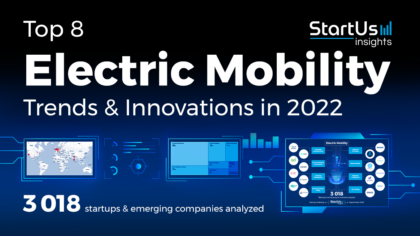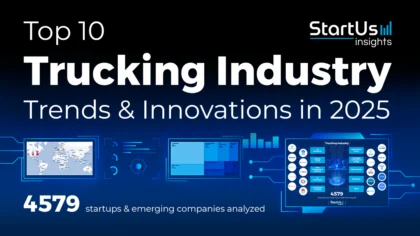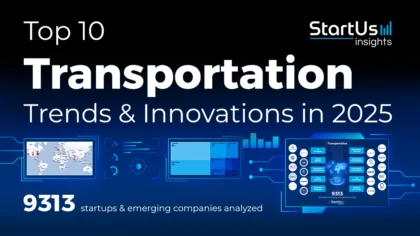Accelerate Productivity in 2025
Reignite Growth Despite the Global Slowdown
The rise in electric mobility trends meets the increasing demand for advancement in charging infrastructure, autonomous mobility, and sustainability. Accelerated large-scale electrification drives progress in charging facilities and innovative battery solutions. Smart charging options, such as electrified roads and rapid DC chargers, help reduce range anxiety. Key trends, including artificial intelligence (AI), the internet of things (IoT), adaptable design, and on-demand manufacturing, enable mobility service providers and businesses to enhance EV adoption and promote eco-friendly operations.
This article was last updated in July 2024.
Top 8 Electric Mobility Trends (2025)
- Charging Infrastructure
- Electric Mobility as a Service
- Artificial Intelligence
- Vehicle-to-Everything
- Internet of Things
- Micromobility
- Big Data & Analytics
- 3D Printing
Innovation Map outlines the Top Electric Mobility Trends & 16 Promising Startups
For this in-depth research on the top electric mobility trends and startups, we analyzed a sample of 3000+ global startups & scaleups. This data-driven research provides innovation intelligence that helps you improve strategic decision-making by giving you an overview of emerging technologies in the EV industry. In the Electric Mobility Innovation Map below, you get a comprehensive overview of the innovation trends & startups that impact your company.
These insights are derived by working with our Big Data & Artificial Intelligence-powered StartUs Insights Discovery Platform, covering 4.7M+ startups & scaleups globally. As the world’s largest resource for data on emerging companies, the SaaS platform enables you to identify relevant technologies and industry trends quickly & exhaustively.

Want to explore all Electric Mobility innovations & trends?
Tree Map reveals the Impact of the Top 8 Electric Mobility Trends
Based on the Electric Mobility Innovation Map, the Tree Map below illustrates the impact of the Top 8 Electric Mobility Trends in 2025. Startups and EV companies are spearheading the development of EV charging infrastructure to support the growing fleet of EVs, facilitating a widespread deployment of charging points (CPs). Real-time monitoring and control of power flows through smart grid management solutions prevent load imbalance and ensure consistent energy sourcing.
Technologies such as vehicle-to-grid (V2G) are lowering operational electricity expenses. AI, big data, analytics, and IoT are also revolutionizing battery management and offering vital insights into vehicle diagnostics, fostering preventive maintenance. The e-mobility sector is pushing sustainability through initiatives like micromobility, on-demand electric fleets, and adopting 3D printing for manufacturing.
Global Startup Heat Map covers 3018 Electric Mobility Startups & Scaleups
The Global Startup Heat Map below highlights the global distribution of the 3018 exemplary startups & scaleups that we analyzed for this research. Created through the StartUs Insights Discovery Platform, the Heat Map reveals that Western Europe sees the most startup activity, followed by India.
Below, you get to meet 16 out of these 3018 promising startups & scaleups as well as the solutions they develop. These 16 startups are hand-picked based on criteria such as founding year, location, funding raised, and more. Depending on your specific needs, your top picks might look entirely different.
Top 8 Electric Mobility Trends in 2025
1. Charging Infrastructure
The surge in EV adoption, driven by sustainability goals, necessitates the swift expansion of electric vehicle supply equipment (EVSE), encompassing hardware, software, and charging stations. The fluctuating power demand of EVs can cause disruptions in the electric grids, a challenge met by charging point owners and grid operators through data sharing on cloud platforms. This collaboration facilitates remote management of EV charging and efficient power distribution to various consumers through smart chargers.
EV charging trends guarantee secure power delivery to electric vehicles. Innovations from startups, including electric road systems (ERS) for on-the-go power supply and ultra-fast DC charging, are emerging. Additionally, the advent of solar-powered EVs with photovoltaic (PV) cells and wireless charging options enhances the ease of using electric vehicles.
Voltpost provides Lamp Post Charge Points
US-based startup Voltpost converts lamp posts into charging points for electric vehicles. The startup’s solution consists of a charging socket and an electricity-tracking meter embedded in the lamp posts. Its companion mobile app allows users to locate and book charging posts. This way, the startup increases access to EV charging ports while reducing the cost, time, and environmental footprint associated with charging infrastructure development.
EVIO offers a Smart Electric Socket
Portuguese startup EVIO develops a smart electric socket device for EV charging. The device, along with the startup’s platform, changes a regular socket into a virtual smart charging station. It allows users to charge their fleet based on energy tariffs and share charging services with a larger network. This enables charging stations and homes to increase revenue while the startup balances out peak loads on local and public grids.
2. Electric Mobility as a Service (eMaaS)
Electric mobility as a service enables on-demand provisioning of transport services for sustainable and convenient transportation. To achieve this, mobility companies leverage joint digital channels that allow users to plan and book rides. Moreover, eMaaS reduces cars on roads and therefore lowers emissions due to mobility. Shared e-mobility also discourages private ownership of vehicles, reducing pollution. Lastly, electric air taxis offer high-speed air mobility through electric vertical take-off and landing (eVTOL) technology, which reduces road traffic congestion.
GO Sharing encourages EV Sharing
Dutch startup GO Sharing simplifies electric vehicle sharing. The startup allows users to book and rent e-scooters, e-bikes, and e-cars via its mobile app. It utilizes quick response (QR) codes to fetch the details of the ride and ensure passenger safety. Moreover, GO Sharing charges its EVs using solar panels to minimize the carbon footprint, eliminating vehicle emissions and traffic congestion.
Alt-Mobility develops an Electric Fleet Management Platform
Indian startup Alt-Mobility develops a cost-effective solution for electric fleet operations, designed to meet all their transportation needs from a single source. By choosing Alt-Mobility, fleet operators significantly lower operational costs compared to diesel or CNG alternatives. This also enables them to actively contribute to a greener environment through zero-emission commercial fleets.
The solution covers leasing, insurance, and maintenance. It is also integrated with advanced telematics for optimizing route planning and real-time vehicle tracking.
3. Artificial Intelligence
The e-mobility sector is utilizing AI to facilitate process automation, refine routes, and boost charging station usage. AI aids in determining optimal periods for EV charging and discharging in V2G applications, while AI-driven battery management systems (BMS) employ self-learning algorithms to monitor battery health and quickly detect cell damage.
Moreover, AI is propelling the growth of autonomous electric vehicles through deep learning and computer vision, elevating safety and autonomy in commuting. The technology further enhances road and driver safety via advanced driver assistance systems (ADAS) and vigilant driver monitoring.
EVE simplifies Electric Fleet Analysis
Irish startup EVE provides AI-based e-mobility analytics software to promote corporate carbon neutrality. It analyzes grid and company fleet data to offer associated charging costs and level-2 emissions. This allows businesses to better strategize operations to reduce their EV charging-related expenses and carbon footprint.
Coulomb AI enables Battery Optimization
Indian startup Coulomb AI develops Battery Observability Platform, an AI-based data analytics platform to optimize battery life. It provides a holistic view of electric vehicular data via electrothermal and data modeling as well as uses machine learning to predict battery parameters. The platform also alerts users in case of battery anomalies, preventing fire hazards.
Moreover, it creates a digital twin of all batteries in the EV to provide battery degradation details and remaining useful life. This allows corrective actions to avoid battery malfunction.
4. Vehicle-to-Everything (V2X)
V2X solutions allow EVs to transfer their excess energy to grids, buildings, houses, and other energy-consuming destinations. Vehicle-to-grid (V2G) charging, a notable example, allows EVs to contribute energy back to the power grid during downtime. Startups are crafting solutions to maintain adequate EV charge – based on travel needs and facilitate energy return to the grid during non-operational periods.
This approach enhances the electric grid’s performance, stability, and reliability, particularly in times of high power demand. Emerging technologies such as vehicle-to-home (V2H), vehicle-to-building (V2B), and vehicle-to-farm (V2F) are channeling power to residential and commercial structures through EVs, guaranteeing secure power supply without overburdening the grid or causing disruptions.
Youree integrates EV Fleet Solutions with the Grid
French startup Youree offers charging solutions for electric vehicles and fleets to reduce costs and environmental impact. Its platform allows users to optimize charging times, and analyze electricity spending and carbon footprint. Fleet managers monitor battery health and utilization through Youree’s data collection from vehicles.
Youree also offers a program that pays users for temporarily stopping charges to support grid flexibility needs. Overall, the company’s solutions enable electric car owners and fleets to turn their electric vehicles into storage devices for a sustainable power grid.
sun2wheel builds Vehicle-to-Home Charging Infrastructure
German startup sun2wheel offers V2H and V2B charging systems. Its smart charging system ensures the availability of sufficient energy in EVs during the day and feeds back the excess to households at night. This way, the smart charging system optimizes the self-consumption of electricity and reduces fuel costs. Additionally, the startup combines PV systems, battery storage, unidirectional and bidirectional charging solutions as well as a load management system to decouple EV charging from the grid.
5. Internet of Things
IoT plays a vital role in EV and battery data collection to improve their monitoring and management. Startups develop IoT-based fault alert systems that notify drivers about vehicle glitches, enabling proactive and in-time maintenance. IoT-enabled sensors also detect vehicle parameters such as speed, battery temperature, state of charge (SoC), state of health (SoH), and more.
Such data aids maintenance planning as well as increases vehicle and battery life. Consequently, it eliminates range anxiety among drivers and reduces battery costs, accelerating EV adoption. Further, IoT allows drivers to reserve parking and charging spots using mobile apps.
Emuron advances Battery Management
Indian startup Emuron creates an IoT-enabled battery management system for fleet operators. The startup’s IoT telematics device tracks the performance of Lithium-ion (Li-ion) batteries. With a global positioning system (GPS), the device offers real-time insights into battery health, location, and useful life. The startup’s solution also allows remote charging and immobilization during emergencies.
BabelFlex develops Gas Sampling Chip Sensors for Electric Batteries
China-based startup BabelFlex builds a lithium battery safety gas sampling chip and algorithm system. Built for high sensitivity and fast responses, the chip promptly generates signals before emergencies occur. For example, it performs actions such as valve closure and shutdown on battery modules, significantly enhancing the safety of lithium battery modules. Apart from its application in the battery system, it is also useful for bigger energy storage stations and as a hydrogen gas sensor.
6. Micromobility
Electric bicycles, e-bikes, e-scooters, electric skateboards, and more offer affordable and personalized transport to commuters. They provide convenient methods of transportation for short trips. Moreover, micromobility solutions significantly reduce the carbon emissions associated with urban mobility. Additionally, it eradicates traffic congestion by reducing the number of cars on roads, further improving sustainability.
Rabbit enables EV Sharing
Egyptian startup Rabbit creates an EV-sharing platform. The startup uses the unlock-and-go and day rentals model to offer e-bikes, e-scooters, and other light vehicles to consumers. Users book a ride via its mobile app. The app deploys QR codes to unlock vehicles and ensure the safety of the vehicle and passengers. The startup’s solution reduces the number of cars on roads and provides convenient transportation methods for short trips.
Strictly Electric makes an Electric Bicycle Conversion Kit
Indian startup Strictly Electric offers EasyKit, an electric conversion kit that changes any regular bicycle into an electric one. The kit consists of controllers, a motorized front wheel, and pedal assist sensors, among others. The pedal assist sensors calculate the effort put by the rider and feed it to the controller, providing the rider ease of movement on roads.
It also offers a removable battery box to facilitate charging from any location based on user convenience. By turning bicycles into e-bicycles, the startup reduces road congestion while providing a means of fast personal transport to consumers.
7. Big Data & Analytics
Electric vehicles, charging infrastructure, power grids, and other connected devices generate massive volumes of data. Big data and analytics solutions leverage this data to provide insights on charging stations and battery status, thus optimizing charging and battery life. Additionally, IoT sensors collect huge chunks of data on vehicle speed, usage, location, temperature, and maximum voltage.
This data powers ML algorithms that enable intelligent vehicle maintenance. Moreover, it improves energy utilization by depicting energy usage under braking and waste heat generation, aiding energy-efficient electric engine designs. The analytics derived from big data also offer navigational aids for autonomous driving and parking.
Mobilyze offers EV Charger Locations
Slovak startup Mobilyze provides a location intelligence platform to identify EV charging hotspots. It combines big data and AI to offer insights into the traffic, population, and parking density of a location. This allows users to select viable areas to install EV chargers, enabling data-driven decisions for faster return on investment (ROI).
TRiDE manages the EV Fleet
TRiDE, an Indian startup, develops IoT sensors for EV fleet management and EVRides, a connected vehicle platform. By integrating IoT sensors with the platform, TRiDE analyzes the driver behavior patterns using video telematics to detect aggressive driving and sudden stops.
Additionally, TRiDE’s AI-powered advanced driver assistance system (ADAS) identifies objects on the road and alerts drivers. The startup also offers real-time battery monitoring, providing data on the state of charge, battery temperature, and other key metrics. It optimizes charging schedules, extend battery life, and reduce the risk of battery failures
8. 3D Printing
Traditional vehicle manufacturing relies on large, costly, and complex molds and machinery. In contrast, additive manufacturing presents a swifter solution, utilizing fewer components and reducing material waste. This approach leverages advanced metal 3D printing to craft detailed parts including side air vents, door handles, and exhaust systems.
Beyond cost-effectiveness, 3D printing facilitates the creation of bespoke EVs tailored to consumer tastes. Startups are increasingly adopting 3D printing for product prototyping, hastening the design finalization process. Such solutions further open the door to on-demand manufacturing and distributed production systems that further reduce costs.
XEV makes 3D Printed EV Parts
Italian startup XEV 3D prints electric car parts. The use of 3D printing eliminates the need for large and complex manufacturing tools, resulting in faster and cost-efficient part production. Once printed, these parts undergo an automated robotic milling process for quality enhancement. The startup’s technology thus enables EV personalization and ensures sustainable vehicle manufacturing.
Sakuu manufactures EV Batteries
US-based startup Sakuu makes Swift Print, battery cells for e-mobility. The startup’s manufacturing platform, Kavian, rapidly 3D prints solid-state batteries on a large scale. Its AI performs quality checks on the printed batteries, enabling faster production and lower associated costs. Moreover, the startup ensures sustainability by utilizing recycled materials as feedstock.
Discover all Electric Mobility Trends, Technologies & Startups
Novel battery technologies, AI, and V2X are set to radically alter the current landscape of the sector. The shift towards fully autonomous electric vehicles is poised to influence passenger transportation, shared electric mobility, and on-demand transportation. Moreover, breakthroughs in battery technologies promise to enhance vehicle performance and safeguard passengers.
The electric mobility trends and startups outlined in this report only scratch the surface of trends that we identified during our data-driven innovation & startup scouting process. Identifying new opportunities & technologies to implement into your business goes a long way in gaining a competitive advantage.










